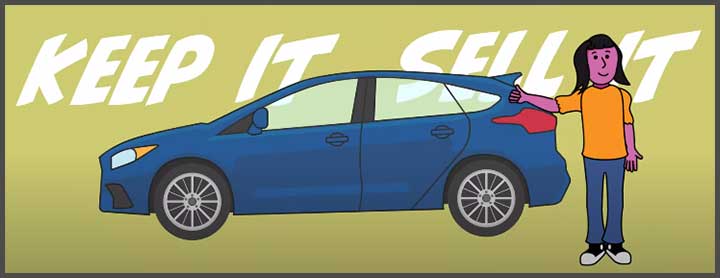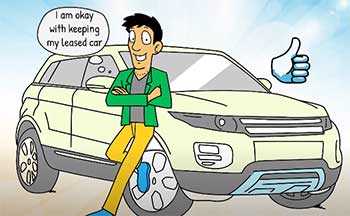While you drive around in that stylish lease, you may start to develop a bond with your vehicle. It just seems right. You’ve broken it in, it runs smoothly, and it fits your life perfectly.
But as the lease end approaches, you are faced with a decision to make – should you buy out your lease?
If you decide to proceed, then the real question becomes, should you opt for a dealer buyout or a customer buyout?
The world of car leasing can be confusing, particularly when it comes to dealer buyout and customer buyout. Let’s break it down.
A Brief Comparison Table
| Aspect | Dealer Buyout | Customer Buyout |
| Who Handles the Buyout? | The dealership handles the buyout, including paperwork and negotiations. | You directly handle the buyout, communicating with the leasing company and managing the paperwork. |
| Costs | The buyout price may include dealership markup for profit. | The buyout price does not include a dealer markup, potentially making it cheaper. |
| Financing | Dealerships can help secure financing and may offer a range of options. | Securing financing is your responsibility. Depending on your credit, it could be more challenging to get a favorable loan. |
| Negotiation Opportunities | There might be room to negotiate the buyout price with the dealer. | The buyout price is usually pre-set, leaving little room for negotiation. |
Dealer Buyout: When Your Dealer Steps In

A dealer buyout occurs when a dealership buys the leased vehicle from the leasing company and then sells it to the customer or another buyer. The dealership handles all the paperwork and negotiations. In many cases, the dealer may also offer financing options for the customer.
Pros of Dealer Buyout
- Convenience: The dealership handles everything. You don’t have to worry about communicating with the leasing company, negotiating terms, or managing paperwork.
- Financing Options: Dealerships often have a range of financing options. You might secure a better deal than with the leasing company.
- Potential for Negotiation: The dealer may be willing to negotiate the purchase price, especially if they are eager to sell.
Cons of Dealer Buyout
- Additional Costs: Dealerships need to make a profit, so they might add extra fees on top of the buyout price.
- Lack of Control: You are dependent on the dealership to negotiate the buyout terms and complete the purchase.
Also Read: Reasons For EchoPark Being So Cheap.
Customer Buyout: Taking Matters Into Your Hands
A customer buyout involves the lessee (you) purchasing the vehicle directly from the leasing company at the end of the lease term.
Pros of Customer Buyout
- Cost-effectiveness: You’re likely to save money with a customer buyout, as you avoid the dealer’s markup.
- Control: You’re in charge of the negotiations and can make decisions based on what’s best for you.
Cons of Customer Buyout
- Responsibility: You have to handle all the paperwork and negotiations yourself.
- Financing Responsibility: You’ll need to secure your own financing. If your credit isn’t great, you might struggle to find a lender.
Key Differences between Dealer Buyout and Customer Buyout
When it comes to deciding between a dealer buyout and a customer buyout, understanding the key differences between the two can make your decision a whole lot easier.
Let’s take a deep dive into the distinguishing factors of these two types of lease buyouts.
- Who Handles the Buyout?
In a dealer buyout, the dealership takes the lead role. They contact the leasing company, negotiate the terms, complete the paperwork, and handle the finances.
This is often seen as a stress-free way to transition from leasing to owning, as you can rely on the dealership’s expertise and connections in the industry.
On the other hand, a customer buyout puts you in the driver’s seat. You directly deal with the leasing company to purchase your vehicle. This might be a bit more daunting, but it gives you control over every aspect of the buyout.
- What about the Costs?

A significant distinction between dealer and customer buyouts lies in the costs involved.
When you opt for a dealer buyout, the dealership will add a profit margin on top of the buyout price set by the leasing company.
This additional cost can be offset by the convenience of the dealer handling the entire buyout process.
In contrast, a customer buyout can save you that dealership markup, potentially making it a cheaper option. However, you’ll be responsible for securing your financing, which might lead to higher interest rates if your credit isn’t stellar.
- And the Financing?
If you choose a dealer buyout, the dealership can help you secure financing. They often have connections with various lenders, enabling them to provide you with a range of financing options.
Plus, the process is typically streamlined since you’re already working with the dealership.
With a customer buyout, securing financing is solely your responsibility. If you have a strong relationship with a bank or credit union, or if your credit score is excellent, this might not be an issue.
However, if you don’t have these advantages, securing a good loan can be challenging.
- Are There Negotiation Opportunities?
In the case of a dealer buyout, there might be room for negotiation. Dealerships are often eager to sell, which can lead to a lower purchase price.
However, bear in mind that they still need to make a profit, so the scope for negotiation may be limited.
In a customer buyout, the buyout price is generally pre-set in the lease contract, leaving little to no room for negotiation with the leasing company. However, the lack of dealer markup might make this option more financially attractive regardless.
Also Read: Comparison of Carvana And ALgo Car Trading Platforms.
Frequently Asked Questions (FAQ)
Yes, you can negotiate the buyout price, but it’s typically easier in a dealer buyout scenario. Dealerships may be more willing to negotiate to move inventory. However, most leasing companies have a set price, and it can be more challenging to negotiate in a customer buyout.
A buyout option on a car lease refers to the option to purchase the leased vehicle at the end of the lease term. The buyout price is often determined at the beginning of the lease and is usually the residual value of the car plus any fees.
A buyout quote is an offer from the leasing company to buy your leased vehicle. It will include the residual value of the car (the expected value at the end of the lease), any remaining payments, and additional fees.
At the end of a car lease, you have several options. You can return the vehicle, opt for a dealer buyout, choose a customer buyout, or lease a new vehicle. Each option has its pros and cons and should be considered carefully based on your financial situation and needs.
Wrapping Up
In the world of car leases, there’s no one-size-fits-all answer to the dealer buyout and customer buyout debate. It’s important to weigh the pros and cons of each, consider your personal circumstances, and make an informed decision.
Regardless of the route you take, make sure it’s one that aligns with your financial and personal goals. It’s always a good idea to consult with a financial advisor or do thorough research before making any major financial decisions.
Happy driving!

